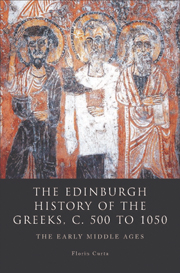Book contents
- Frontmatter
- Contents
- List of Illustrations
- List of Tables
- Acknowledgements
- Series Editor's Preface
- Introduction
- 1 The last century of Roman power (c. 500 to c. 620): army, church, and countryside
- 2 Collapse or adaptation? The problem of the urban decline in late antique Greece
- 3 Invasion or inflation? Hoards and barbarians in sixth- and early seventh-century Greece
- 4 Dark-Age Greece (c. 620 to c. 800)
- 5 Revival and expansion (c. 800 to c. 900)
- 6 The beginning of prosperity (c. 900 to c. 1050)
- 7 Early medieval Greece and the Middle Byzantine economy
- 8 Social structures and Byzantine administration in early medieval Greece
- 9 Christianity in early medieval Greece
- 10 Conclusion: the people of early medieval Greece
- Bibliography
- Index
10 - Conclusion: the people of early medieval Greece
Published online by Cambridge University Press: 05 August 2013
- Frontmatter
- Contents
- List of Illustrations
- List of Tables
- Acknowledgements
- Series Editor's Preface
- Introduction
- 1 The last century of Roman power (c. 500 to c. 620): army, church, and countryside
- 2 Collapse or adaptation? The problem of the urban decline in late antique Greece
- 3 Invasion or inflation? Hoards and barbarians in sixth- and early seventh-century Greece
- 4 Dark-Age Greece (c. 620 to c. 800)
- 5 Revival and expansion (c. 800 to c. 900)
- 6 The beginning of prosperity (c. 900 to c. 1050)
- 7 Early medieval Greece and the Middle Byzantine economy
- 8 Social structures and Byzantine administration in early medieval Greece
- 9 Christianity in early medieval Greece
- 10 Conclusion: the people of early medieval Greece
- Bibliography
- Index
Summary
It has been a major argument of this book that, following the general abandonment of the Balkan provinces under Emperor Herakleios, the army, either land (thematic) troops or the navy, played a fundamental role in the early medieval history of Greece. The military created the political and administrative infrastructure which secured the survival of Roman (Byzantine) power in coastal areas and on several islands. Land troops may have been responsible for the repopulation of large parts of Peloponnesos in the early ninth century, while the first social hierarchies in ‘Dark-Age’ Greece were essentially military. Around 1000, high-ranking officials such as Krinites, the strategos of Hellas, or Christopher, the katepano of Longobardia, were prominent patrons of churches. The presence of the navy also created the need for local markets on which monetary exchanges continued, albeit on a much reduced scale. As late as the early eleventh century, the military continued to be a key factor in the injection of coins into the local economy, both in urban centres and in the countryside.
Within the general framework defined by the ubiquity of the army in early medieval Greece, three features are especially striking. The first is the remarkable absence of any attempts at usurping the imperial power, which are otherwise well documented for the themes of Anatolikon, Opsikion, and Armeniakon. In Greece, all such attempts were nipped in the bud, most famously at the beginning of Romanos I and Constantine VII Porphyrogennetos’ joint rule (920–944).
- Type
- Chapter
- Information
- The Edinburgh History of the Greeks, c. 500 to 1050The Early Middle Ages, pp. 276 - 297Publisher: Edinburgh University PressPrint publication year: 2011



